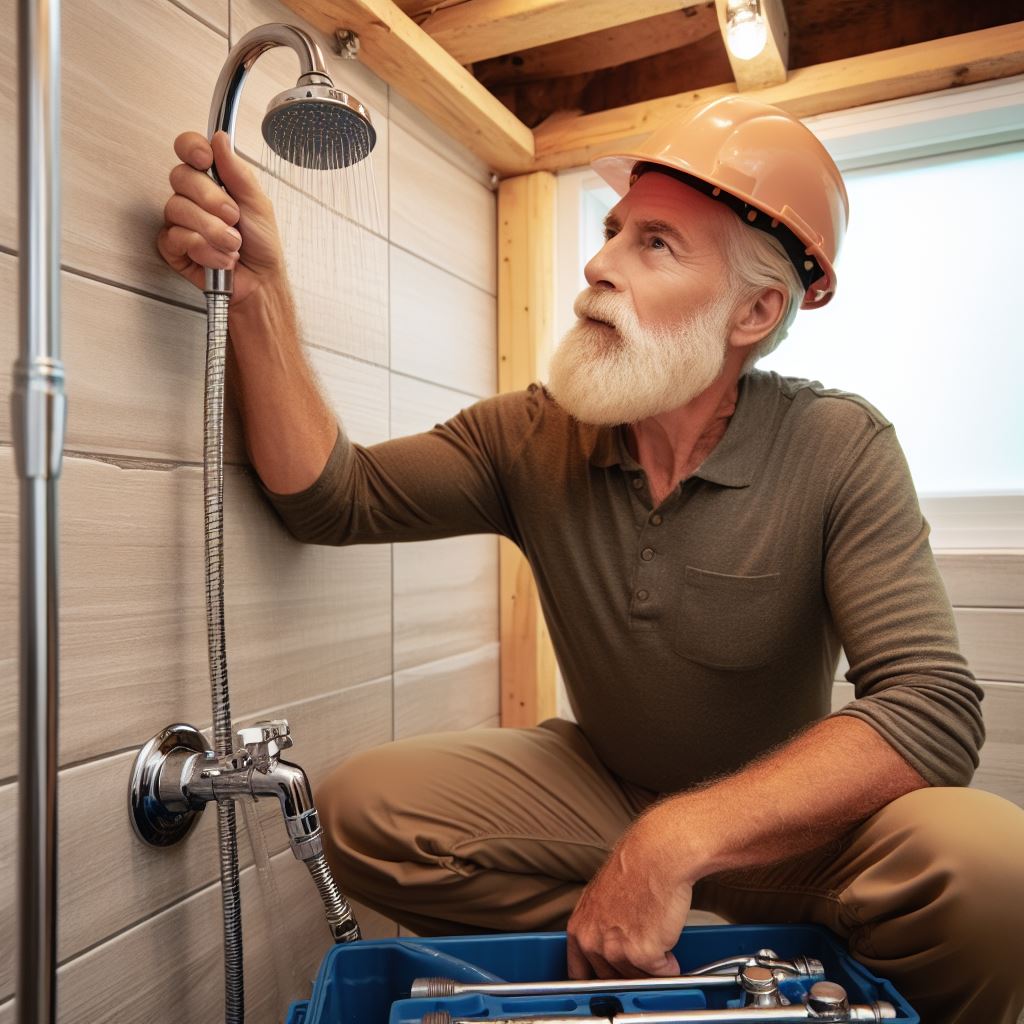Introduction
Career pathways are crucial as they provide guidance and direction for professional growth.
This blog section explores the journey from apprentice to master plumber, highlighting key milestones and accomplishments.
Importance of Career Pathways
Career pathways play a vital role in guiding individuals towards their desired professional goals.
They provide a structured roadmap that helps individuals navigate the complex world of work.
Without clear career paths, individuals may struggle to identify their next steps or make informed decisions.
They may also miss out on valuable opportunities for growth and advancement.
From Apprentice to Master Plumber
Becoming a master plumber is a rewarding career choice that requires dedication, training, and experience.
It all begins with an apprenticeship, where aspiring plumbers gain the foundational skills necessary for success.
Throughout their apprenticeship, they learn from experienced plumbers, honing their techniques and understanding of the trade.
As apprentices gain more knowledge and practical experience, they can progress to the journeyman level.
This stage allows them to work independently and take on more complex projects under limited supervision.
The journeyman phase is a crucial stepping stone towards becoming a master plumber.
To achieve the coveted title of master plumber, individuals must demonstrate exceptional skills and knowledge.
They must pass a rigorous examination and meet specific requirements set by their local plumbing board or regulatory authority.
Once they attain this status, they become recognized experts in their field, capable of handling intricate plumbing projects with ease.
In short, career pathways are essential for professional growth.
From apprentice to master plumber, each step in the journey brings valuable learning opportunities.
By following this career path, individuals can achieve their goals and become masterful in their craft.
Apprenticeship as the Starting Point
Definition and Purpose of Apprenticeship
Apprenticeship is a hands-on training program that combines on-the-job experience with classroom instruction.
The purpose of apprenticeship is to develop skilled workers in specific trades, such as plumbing.
Benefits of Becoming an Apprentice Plumber
- Opportunity to earn while learning: Apprentices receive a wage while gaining valuable experience.
- Job security: Plumbers are always in demand, ensuring long-term career prospects.
- Hands-on experience: Apprentices work alongside experienced plumbers, gaining practical skills.
- Personal growth: Apprenticeship instills discipline, work ethic, and professionalism.
Requirements and Qualifications for Apprenticeship Programs
To become an apprentice plumber, individuals typically need to meet the following criteria:
Transform Your Career Today
Unlock a personalized career strategy that drives real results. Get tailored advice and a roadmap designed just for you.
Start Now- High school diploma or equivalent
- Minimum age requirement (usually 18 years old)
- Physically fit and capable of performing manual labor
- Passing score on aptitude test and interviews
Some programs may have additional requirements, such as completion of specific courses or certifications.
Typical Tasks and Responsibilities as an Apprentice Plumber
As an apprentice plumber, you will be responsible for:
- Assisting journeyman and master plumbers in various tasks and projects.
- Learning how to install, repair, and maintain plumbing systems.
- Reading and interpreting blueprints and technical diagrams.
- Identifying and troubleshooting plumbing issues.
- Operating and maintaining tools and equipment used in plumbing work.
- Ensuring compliance with building codes and safety regulations.
- Collaborating with team members to complete projects efficiently.
- Continuously improving skills through ongoing training and professional development.
Apprenticeships typically span a duration of 4-5 years, during which apprentices gain comprehensive knowledge and proficiency in the plumbing trade.
By following the path of apprenticeship, individuals can lay a strong foundation for a successful career as a master plumber.
Embarking on an apprenticeship allows aspiring plumbers to acquire the necessary skills, knowledge, and experience required to excel in the field.
From apprenticeship, plumbers can progress to becoming a licensed journeyman and eventually achieve the status of a master plumber.
In the next section of this blog series, we will explore the journey from journeyman to master plumber and the opportunities it presents.
Read: Welder’s Health Risks and How US Companies Are Addressing Them
Advancing to journeyman plumber
Description of the journeyman plumber role and responsibilities
- As a journeyman plumber, you have completed your apprenticeship and gained significant knowledge and experience.
- Your responsibilities include installing, repairing, and maintaining plumbing systems in residential and commercial buildings.
- You may also be involved in reading blueprints, interpreting building codes, and ensuring compliance with regulations.
- Additionally, you are expected to provide guidance and supervise apprentices.
Additional training and certification required
- To become a journeyman plumber, you need to pass the licensing exam administered by your state or local authorities.
- This exam tests your knowledge of plumbing codes, regulations, system design, and installation techniques.
- Continuing education courses may also be required to keep up with new technologies and advancements in the field.
Gaining practical experience as a journeyman plumber
- Working as a journeyman plumber allows you to gain hands-on experience and refine your skills.
- You will encounter a wide range of plumbing projects, from routine repairs to complex installations.
- Interacting with clients and understanding their needs will further enhance your problem-solving and customer service skills.
- Being part of a plumbing team will expose you to different perspectives and foster collaboration.
- All these experiences contribute to your growth as a professional.
Opportunities for career growth and specialization
- As a journeyman plumber, you have various opportunities for career advancement and specialization.
- You can become a master plumber by gaining additional experience and passing the required certification.
- Master plumbers have the ability to work independently, handle complex plumbing projects, and oversee larger teams.
- If you have a particular interest, you can choose to specialize in areas like green plumbing, industrial plumbing, or pipefitting.
- Specializing in a niche field can lead to higher earning potential and increased job prospects.
In essence, advancing to the journeyman plumber level brings new responsibilities, additional training, and exciting career prospects.
It is a significant milestone in your plumbing career, as it showcases your expertise and allows for further growth and specialization.
Read: Freelance Welding in the USA: Opportunities and Challenges

Becoming a Master Plumber
Definition and Significance of the Master Plumber Title
A master plumber is an experienced and highly skilled professional in the field of plumbing.
The title of master plumber is significant as it represents the highest level of expertise and qualification.
Educational and Professional Requirements for Attaining Master Plumber Status
To become a master plumber, one must first complete an apprenticeship program, which typically takes several years.
Apprentices gain valuable knowledge and hands-on experience working under the guidance of licensed plumbers.
After completing the apprenticeship, aspiring master plumbers must pass a licensing exam to obtain their journeyman plumber license.
To attain master plumber status, individuals must accumulate a certain number of work experience hours as a journeyman plumber.
Benefits and Responsibilities of Being a Master Plumber
Being a master plumber comes with several benefits, including higher earning potential and increased job opportunities.
Master plumbers have the authority to oversee and mentor apprentice and journeyman plumbers.
They are responsible for ensuring that plumbing systems are installed and maintained according to industry standards and regulations.
Transform Your Career Today
Unlock a personalized career strategy that drives real results. Get tailored advice and a roadmap designed just for you.
Start NowExamples of Career Pathways for Master Plumbers
- Entrepreneurship: Many master plumbers choose to start their own plumbing businesses, taking advantage of their expertise and experience.
- Construction Industry: Master plumbers can work in the construction industry, overseeing plumbing installations in new building projects.
- Consulting and Inspection: Some master plumbers become consultants or inspectors, offering their expertise to review and evaluate plumbing systems.
- Teaching and Training: Experienced master plumbers can become instructors, sharing their knowledge with aspiring plumbers in vocational schools or training programs.
- Government and Municipalities: Master plumbers can find employment in governmental organizations, ensuring plumbing code compliance and providing expert advice.
- Research and Development: Some master plumbers venture into research and development, contributing to the advancement of plumbing technologies and materials.
Basically becoming a master plumber requires dedication, education, and experience.
The title of master plumber holds significant value and opens up various career pathways in the plumbing industry.
Read: Challenges Faced by Plumbers in the American South
Challenges and rewards in the plumbing industry
Possible obstacles and difficulties along the career pathway
The plumbing industry presents its fair share of challenges and obstacles for those venturing into this career pathway.
From the beginning, aspiring plumbers must undergo rigorous training and apprenticeships to gain the necessary skills and knowledge.
While this training is essential, it can be physically demanding and often requires long hours of work.
Plumbers frequently have to deal with tight spaces, uncomfortable working conditions, and demanding clients.
Additionally, they may have to work in hazardous environments or handle potentially dangerous equipment.
Another obstacle in the plumbing industry is the constant need to stay updated with new technology and industry regulations.
Plumbing codes and standards are consistently evolving, requiring plumbers to continuously educate themselves to maintain their expertise.
This can be challenging for those who prefer a static work environment.
Analysis of the various rewards and advantages of pursuing a career as a plumber
Despite the challenges, a career in plumbing offers significant rewards and advantages.
One of the primary benefits is job stability.
Plumbing is an essential service that will always be in demand, ensuring a steady stream of employment opportunities.
Moreover, the plumbing industry offers strong earning potential.
Skilled plumbers who have gained experience and expertise can earn competitive wages, even surpassing the average income of many other professions.
Plumbers also have the opportunity to secure excellent benefits such as healthcare and retirement plans.
Another advantage of pursuing a career in plumbing is the potential for entrepreneurship.
Many plumbers choose to start their own businesses, allowing them to have more control over their work and potentially earn higher profits.
Furthermore, plumbing offers a sense of fulfillment for those who enjoy problem-solving.
Transform Your Career Today
Unlock a personalized career strategy that drives real results. Get tailored advice and a roadmap designed just for you.
Start NowPlumbers play a crucial role in society by ensuring clean and functioning water systems, providing a valuable service to communities.
Testimonials or interviews with experienced plumbers to provide real-life perspective
To gain a real-life perspective on the challenges and rewards of the plumbing industry, we interviewed experienced plumbers who have journeyed along this career pathway.
John, a plumber with 20 years of experience, shared that while the work can be physically demanding, the sense of accomplishment and problem-solving satisfaction he achieves is immensely rewarding.
He also emphasized the stability and financial security that comes with being a plumber.
Sarah, another seasoned plumber, highlighted the opportunities for career growth and learning.
She mentioned that plumbing never gets monotonous as every day brings new challenges, allowing her to continuously improve her skills and face different types of projects.
Both John and Sarah expressed the fulfillment they derive from providing vital services to their communities.
They highlighted the importance of clean water and functioning plumbing systems for people’s daily lives, highlighting the value plumbers bring to society.
Read: The Environmental Impact of Welding in the USA: What’s Being Done?
Conclusion
To recap, the apprentice-to-master plumber career pathway is a rewarding one.
For those interested in pursuing a career in plumbing, don’t hesitate to take the plunge.
The field of plumbing offers immense potential for success and satisfaction.
Career Pathway Recap:
- Apprenticeship Beginnings: Launch your plumbing journey as an apprentice, mastering the basics under seasoned professionals.
- Skill Refinement: Progress to refine your skills, tackling diverse projects, and gaining hands-on experience in the plumbing trade.
- Licensing and Certification: Attain the necessary licenses and certifications, marking milestones on your path to becoming a master plumber.
- Leadership and Mentorship: Transition into leadership roles, guiding apprentices and sharing your expertise in the plumbing industry.
Encouragement for Aspiring Plumbers:
- Diverse Opportunities: Plumbing offers diverse career paths, from residential to commercial, providing a range of exciting opportunities.
- Steady Demand: Embrace the steady demand for skilled plumbers, ensuring a stable and rewarding career in the trade.
Final Thoughts on Success and Satisfaction:
Reflect on the potential for success and satisfaction in mastering the plumbing craft, where dedication leads to fulfillment.
[E-Books for Sale]
The Big Book of 500 High-Paying Jobs in America: Unlock Your Earning Potential
$19.99 • 500 High-Paying Jobs • 330 pages
Explore 500 high-paying jobs in America and learn how to boost your career, earn more, and achieve success!
See All 500 High-Paying Jobs of this E-Book
1001 Professions Without a Degree: High-Paying American Jobs You Can Start Now
$19.99 • 1001 Professions Without a Degree • 174 pages
Discover 1001 high-paying jobs without a degree! Unlock career tips, skills, and success strategies for just $19.99!




